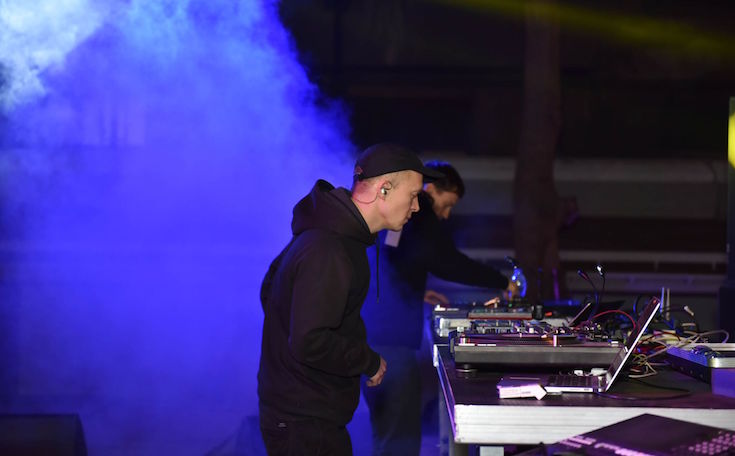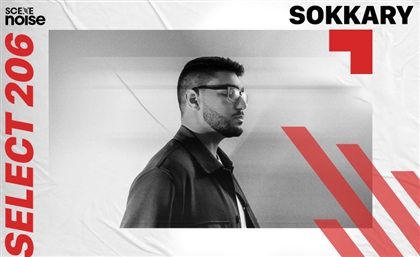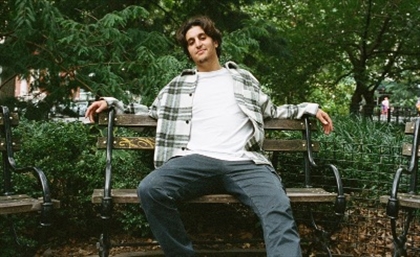Den Sorte Skole on Playing D-CAF, Collaborating with Islam Chipsy, and the Universality of Music
In an impromptu meet up, ahead of their gig at D-CAF last week, we interviewed Danish experimental group Den Sorte Skole on their beginnings, their previous visits to the Middle East, and collaborating with Egypt's own Islam Chipsy.

Every year, around the same time as now, artists from all over the world converge in Downtown Cairo for the annual Downtown Contemporary Arts Festival (D-CAF). The festival's music program brings our city some of the world's best musicians, always giving a lot of attention to fresh and edgy experimental music. This year on their calendar, one musical act stands out.
You might already know of Den Sorte Skole - most people in Egypt don't. If you were in attendance of their performance at the GrEEK Campus last week, you will have already discovered that their sound is unorthodox, and that their energy is overwhelming. They are supposedly a trio; Simon Dokkedal, Martin Højland, and Martin Fernando Jakobsen. However, only two artists tour now, the third is busy running an NGO called 'Turning Tables' that helps marginalised youth through music and film in different countries around the world.
Dokkedal and Højland, however, remain as the frontmen of the group, carrying on the journey that Fernando Jakobsen laid the foundations for years ago. Their music builds up slowly, utilising vinyl samples and dissonant sounds to deliver a magnificent, genre-bending sonic atmosphere, a sound best portrayed on stage during their live performances. Bucket list material for any experimental music lover.
What does Den Sorte Skole mean and how did the name originate?
Simon: We came up with this name 15 years ago. A direct translation isn’t very accurate but, in English, you would say it means ‘The Black School’. It also has another meaning which refers to this really strict school system where the teachers would punish students physically for their inability to learn and have them learn the hard way. For us, being young at the time and finding out about this name, we said okay, we’ll be strict music educators for the people. But at the end of the day, it’s a Danish name that supports our identity while touring the world.
So how did you guys meet?
Martin: We met in this outdoor area of Copenhagen on a summer day. I had my set-up outside and was playing vinyls when Simon showed up and asked if he could bring his own records and play with me, we've been playing together ever since.
What’s your earliest vinyl memory?
Martin: In Denmark, we have a lot of children’s stories that were on vinyl, this was the beginning of the 1980s and that’s how I had a lot of my music as well. I remember one day, when my dad accidentally put the records on top of our kerosene heater. That’s when I lost a lot of my earliest vinyls.
Simon: For me, it started with my parents. My father had a really expensive turntable and the pickup was, like, insanely expensive. So, obviously, I couldn’t touch it, but then, of course, I did [he laughs]. So it was how I would listen to music in my childhood before CDs became all the craze shortly after.
When would you say you started going out and digging for music?
Simon: For me, I started collecting cassette tapes and CDs when I was young. My parents took me on trips to Eastern Europe. Music there was much cheaper than in Copenhagen. I ended up with a lot cassette tapes by the time I was 10.
Martin: Yeah... like Simon, I started with CDs and tapes more or less around the same age.
What’s the most precious or cherished musical possession in your collection?
Simon: Wow that’s a really tough question! I think we have collected so many records for so many years...
Martin: I think we collect so many records, but we do it mainly for the music. Expensive records don’t necessarily appeal to me more than cheap ones, it’s the music we find on them.
Simon: But if I had to name something I’d say we’re both really enjoying this record by Bengali artist Ananda Shankar. It’s very groovy, with not just sitar, but a lot of instruments you can feel, like tablas and other percussion.
Your live show is constantly expanding, can you walk us through your current setup?
Martin: We don’t travel with the actual records anymore. We use Serato, with two timecode vinyls and two AKAI MPD 226s, so we can chop up the records and use very tiny fractions of each one.
Simon: The switch to digital happened a few years back because the way we played got more complicated and we found ourselves constantly having to carry more records with us because we do a ridiculous amount of sampling in a very short stretch of time. We figured if we keep doing this we’ll need eight more hands!
Martin: Yeah, for instance, we could have up to 1,500 samples in one track and it would be impossible to recreate that in the same way, which always keeps our shows diverse and interesting.  So you guys played some of the biggest festivals around the world including Roskilde Festival to a crown of more than 25,000 people. How does it feel to be playing in the heart of Downtown Cairo for an Egyptian crowd for the first time?
So you guys played some of the biggest festivals around the world including Roskilde Festival to a crown of more than 25,000 people. How does it feel to be playing in the heart of Downtown Cairo for an Egyptian crowd for the first time?
Simon: We’re really looking forward to experiencing the crowd. I think it’s a nice stage in a great space. The atmosphere is quite nice with the trees, the contrast of old and new buildings here, and the big sound system, but the crowd will definitely be the highlight.
Martin: We have this idea that the crowd here is much more open musically. Their background is real music with real instruments and they have an appreciation for long pieces of music. The fun thing is that a lot of sounds are from real instruments because of the samples, so it’s a mix, but it requires patience and open-mindedness from people. I think it’ll turn out great.
Where else in the Middle East did you play?
Martin: We played in Lebanon many times over five years and on several occasions including concerts in Palestinian refugee camps a few years ago. We also gave workshops in the camps through our NGO.
Simon: We also played in Tunisia and Jordan.  Are you guys only here for the D-CAF performance?
Are you guys only here for the D-CAF performance?
Martin: No, actually, we’re also here to collaborate with Islam Chipsy, we’ve been working with him for the past five days, he’s also coming on stage with us tonight.
How did you meet Islam?
Martin: We played on the same stage together at a festival in France, he came on after us and we couldn’t believe what was happening.
Simon: Yeah, he blew our minds, also because we were into the Shaabi style and the energy he came with that evening was amazing. We’ll be doing this freestyle back and forth between us.
More and more Middle Eastern artists are being welcomed in foreign countries with their alternative style of music. What would you attribute this to?
Martin: I just think the world is getting smaller all around and, hopefully, there will be more room in people’s minds to accept another culture. Music is a universal language, but sometimes there’s too many barriers. Now you can go listen to baile funk from South America or whatever, so people’s tastes are definitely getting broader.  So what’s next for Den Sorte Skole?
So what’s next for Den Sorte Skole?
Simon: We recorded music with a 48-piece orchestra that we also played a show with. We’re flying home tomorrow to finish mixing it. We really took the orchestra out of their comfort zone and made them play music in ours, which I don’t think they were used to. It was beautiful because the sound is so rich with all the instruments channelling our music. It’s a really good mix of classical and rhythmic music.
Martin: We’re also playing Roskilde again this summer and we’re inviting guest musicians from all over the world to come with us on a big stage and play for 50,000 to 60,000 people. It’s the biggest thing we’ve ever done.
Follow Den Sorte Skole on Facebook and check out their Soundcloud for more music.
























